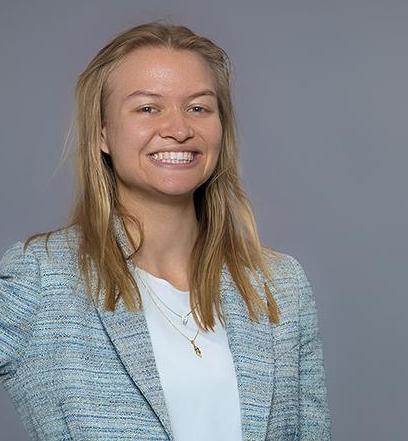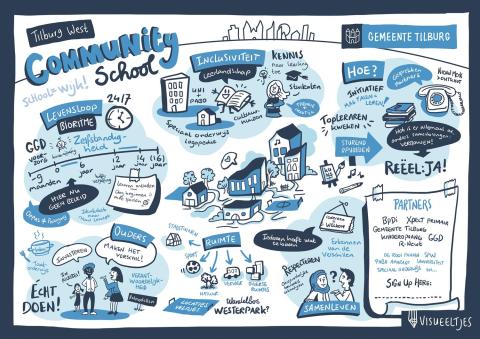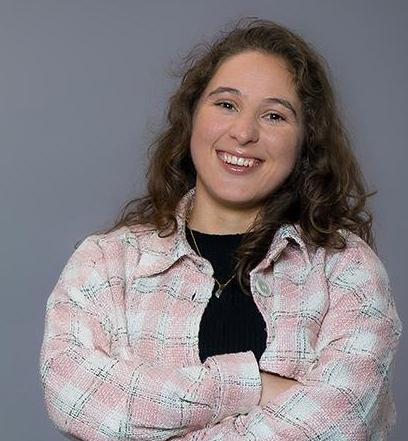Students make the connection between science and an intractable practice
Tax law student Charlotte Kaebisch and philosophy student Naima El Azzouzi joined the ‘Community School’ Impact Lab Project as part of the Outreaching Honors Program. Their assignment was to give advice on the continued implementation of a Community School in Tilburg, an educational community for children aged 0 to 16 that aims to nurture the growth and talents of every child. ‘This experience has sparked a flame in me, and I am resolved to dedicate my career to helping and improving Dutch society,’ Naima says.
Charlotte and Naima recently presented the findings of their study to the Community School partners. Together with Arelys Eduardo and Kalliopi Argyraki they worked on this project for four months. It wasn’t all clear sailing, and that had everything to do with the Covid-19 pandemic. The four students (six, initially) had to do all research – mostly interviewing all parties involved in the Community School – through videoconferencing. They did not meet a single participant, not even their supervisors, in person. Nor could they visit the school concerned. Yet despite the inevitable distance this created, they keenly felt how deeply committed all partners are to this project.

I was raised to be helpful
Charlotte Kaebisch - tax law student
What is your personal involvement in this project?
Charlotte: ‘I was raised to be helpful, to try and help others. Our parents have been sheltering foster children for a long time. I grew up with them and witnessed first-hand that children become socially deprived if they don’t have equal opportunities. I’m a swimming instructor at the local swimming association and the rescue team, and I see these differences there, too. That’s why I think this is a wonderful project and why I wanted to do my bit.’
Naima: ‘My social engagement shows from the degree programs I have taken. Before I took up philosophy, I studied journalism. But journalists watch from the sidelines: they observe and report on social issues, without making an active contribution. I was also looking for more depth, which is why I opted for philosophy, and specifically the Philosophy of Contemporary Challenges Master’s program. I am also on the Roosendaal city council for the Green Left (GroenLinks). Municipal councillors discuss at great length social issues that affect their city and potential solutions, but actually implementing these solutions is not up to them. I wanted to see for myself how several parties within a city work together to make something good happen, to make the city ‘run’ better, to help people. The Community School was a unique opportunity for me to experience such a collaboration.

The Community School is an initiative of several partners in Tilburg and part of the ‘Making Knowledge Work City Deal: A Socially Innovative Neighborhood Approach’. In this project, the City of Tilburg, Fontys University of applied sciences, and Tilburg University work together to jointly analyze societal issues using scientific and practice-oriented research.
The Jeanne d'Arc elementary school in Tilburg has stepped up to the plate to transform itself into a Community School: a school that transcends boundaries, geographical ones included, to become embedded in the larger area and integrated into the neighborhood structure to benefit both children and their parents.

Studying philosophy has taught me to look at issues from a distance
Naima El Azzouzi - philosophy student
What knowledge and skills from your studies did you find useful?
Naima: ‘Studying philosophy has taught me to take a step back and to look at issues from a distance. That shows me the bigger picture and connections. I have learned to look for the meaning behind words: what is the significance of the words someone chooses to use?’
Charlotte: ‘I mostly concerned myself with the legal aspects of running the Community School. How can the arrangements the various partners agree to be captured legally? Much of what I learned, both knowledge and skills, I learned by doing. The theoretical knowledge I had I was able to use in practice.’
What impact has this Impact Lab project had on you?
Charlotte: ‘I am delighted to have been involved in this amazing project. It was educational, not least because of the many obstacles, large and small. What I particularly enjoyed was taking the interviews. That was a new skill for me. The stories and enthusiasm energized me to continue.’
Naima: ‘For me it was finding out that I am truly passionate about talking to people in the field who really get things done. That’s what makes my heart beat faster, not city council debates about these people. I was inspired to see how all these parties work together to achieve a common goal. So many parties are involved in the Community School, I simply had no idea: the city, the library, physiotherapists, social housing associations, childcare services, municipal health services, and so on. I have seen how together they make an essential contribution to society, and that is precisely what I want to do, too.
It was truly impressive to see how all students were moved by the problems we are facing, and that sensitivity has helped forge a connection between science and established practice.
Jopie de Bruin - principal of the Jeanne d’Arc Jena Plan elementary school
Jopie de Bruin, principal of the Jeanne d’Arc Jena Plan elementary school indactes that 'in developing the Community School, we are currently facing two key questions: how do we build a durable organization, and how do we monitor whether the things we do have the desired effects?'
Jopie: 'When we were offered the opportunity to participate in “City Deal Tilburg”, we did not hesitate to seize it. It is a wonderful opportunity to work with Tilburg University’s finest students to find answers to these questions. Expectations were high: here was a group of intelligent people from various disciplines keen to make a positive contribution. Undaunted by a range of corona restrictions, a group of initially six students set to work enthusiastically on our questions. The study resulted in a report that will help us move forward: it is a solid basis for follow-up questions and for further research with a new group of researchers. It was truly impressive to see how all students were moved by the problems we are facing, and that sensitivity has helped forge a connection between science and established practice. It shows how science can and must make a material contribution to solving practical issues. It was also good to see how the students found their footing in project monitoring, cooperation, and coming up with a plan B when things didn’t quite go according to plan.’'
Date of publication: 19 May 2021
